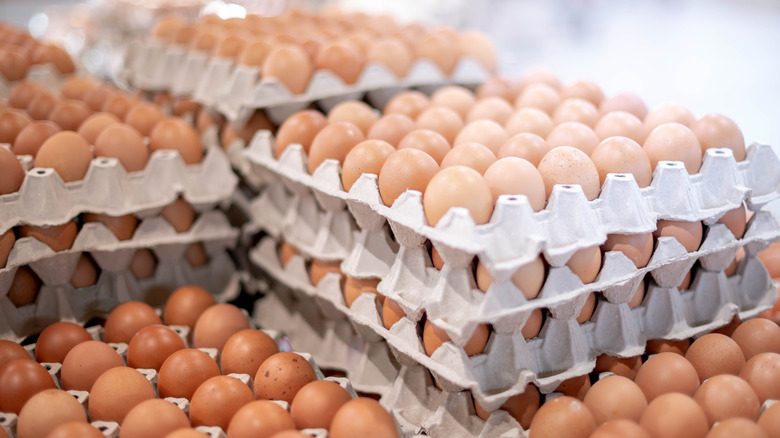What It Really Means If Your Eggs Are 'Regenerative'
In the supermarket, the shelves of the eggs section already groan under the weight of various categories. Free range, organic, white, brown, and more dazzle the eye. However, if Bloomberg's reporting is to be believed, a new category will emerge to make our egg selection even more esoteric. There are now regenerative eggs.
Regenerative eggs are eggs produced from regenerative agriculture, which is a method of farming that focuses on cultivating rich soils. Rich soils would help capture greenhouse gases so the eggs are billed as the environmentally friendly part of your breakfast, and for that label, command a $8 price tag.
"Regenerative agriculture, at its core, aims to combat climate change and improve the ecosystem of the planet," John Brunnquell, PhD, President and CEO of Egg Innovations, explained to Watt Poultry in 2020. The four pillars Brunnquell implements are an on pasture promotion of biodiversity, elimination of all synthetics, the construction of multi-tier vegetation in pastures, and utilizing ground covers.
John Chester — a filmmaker, TV director, and farm owner — told Time in greater detail how these elements can redress the erosion of topsoil that American agriculture has caused, destroying a third of it in the last 260 years. The various pillars that Brunnquell listed are used to mimic and reinforce the ecosystems which nature would run anyway, thus lessening the extractions of the farm and supporting a more long-term sustainable view.
The eggs are simply the product being test run in this manner. If successful, other foods could follow.
The problems with this eggs category
Establishing regenerative eggs as the new free range or organic will prove somewhat difficult. The most obvious hurdle is the $8 per dozen or the $15 per dozen John Chester admitted to in his interview with Time. The argument Chester gives is that the cheapness we expect of eggs is because as a society we have grown complacent over the horrors we inflict on chickens and the poorer quality of the eggs we eat. If we want to live in a sustainable, humane manner, we will need to accept the higher paycheck.
Other issues on this initial selling that Julie Stanton, associate professor of agricultural economics at Pennsylvania State University Brandywine, brings up for Bloomberg include that it is difficult to snappily say what regenerative farming is and the nutrient benefits of such practices are minimal if any.
Grist also throws some uncertainty at the claim that richer soil will hoover greenhouse gases. The sequestering of gases is subject to so many variables, they explain from a paper by the World Resources Institute, that it's difficult to pinpoint how much of a contribution regenerative farming would necessarily bring and how much it would merely claim. Though they hasten to add that they do not intend to imply that regenerative farmers are deceitful, just that it is to measure their claims.
Without a standard to measure the ecological benefits of regenerative eggs, the label only attempts to paint the product as worthy of its price.

